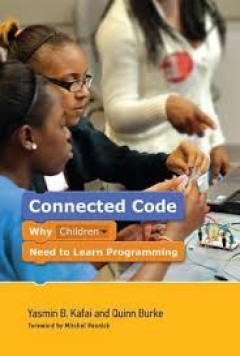Filter by

Warren's Abstract Machine: A Tutorial Reconstruction
"This tutorial demystifies one of the most important yet poorly understood aspects of logic programming, the Warren Abstract Machine or WAM. The author's step-by-step construction of the WAM adds features in a gradual manner, clarifying the complex aspects of the design and providing the first detailed study of WAM since it was designed in 1983. Developed by David H.D. Warren, the WAM is an abs…
- Edition
- -
- ISBN/ISSN
- 9780262255585
- Collation
- 1 online resource (xvi, 114 pages) :illustrations.
- Series Title
- -
- Call Number
- -

Connected Code: Why Children Need to Learn Programming
Why every child needs to learn to code: the shift from "computational thinking" to computational participation.OCLC-licensed vendor bibliographic record.
- Edition
- -
- ISBN/ISSN
- 0262319241
- Collation
- 1 online resource.
- Series Title
- -
- Call Number
- -

Code to joy :why everyone should learn a little programming
Includes index."With a few basic programming skills, we can change our relationship with the machines in our life and get more done with their help"--OCLC-licensed vendor bibliographic record.
- Edition
- -
- ISBN/ISSN
- 9780262375979
- Collation
- 1 online resource
- Series Title
- -
- Call Number
- -

The constitution of algorithms :ground-truthing, programming, formulating
"Ethnographic study of the constitution of algorithms"--OCLC-licensed vendor bibliographic record.
- Edition
- -
- ISBN/ISSN
- 9780262363235
- Collation
- 1 online resource.
- Series Title
- -
- Call Number
- -

Critical code studies :initial methods
"Critical Code Studies (CCS) names a set of methodologies for the exploration of computer source code using the hermeneutics of the humanities. Like 10 PRINT CHR$ (205.5 + RND (1)); : GOTO 10, Mark Marino's Critical Code Studies treats code not as merely functional but as a text, one that can be read, and misinterpreted, by non-programmers. As the author notes, code's "meaning is not determined…
- Edition
- -
- ISBN/ISSN
- 9780262357425
- Collation
- 1 online resource.
- Series Title
- -
- Call Number
- -

Voicing code in STEM :a dialogical imagination
"The authors develop a framework for introducing coding in the science classroom, in which coding is a form of embodied activity, expression, and language"--OCLC-licensed vendor bibliographic record.
- Edition
- First edition.
- ISBN/ISSN
- 0262363070
- Collation
- 1 online resource.
- Series Title
- -
- Call Number
- -

Certified programming with dependent types :a pragmatic introduction to the C…
The technology of mechanized program verification can play a supporting role in many kinds of research projects in computer science, and related tools for formal proof-checking are seeing increasing adoption in mathematics and engineering. This book provides an introduction to the Coq software for writing and checking mathematical proofs. It takes a practical engineering focus throughout, empha…
- Edition
- -
- ISBN/ISSN
- 9780262317870
- Collation
- 1 online resource (xii, 424 pages)
- Series Title
- -
- Call Number
- -

Value sensitive design :shaping technology with moral imagination
Using our moral and technical imaginations to create responsible innovations: theory, method, and applications for value sensitive design. Implantable medical devices and human dignity. Private and secure access to information. Engineering projects that transform the Earth. Multigenerational information systems for international justice. How should designers, engineers, architects, policy maker…
- Edition
- -
- ISBN/ISSN
- 9780262351690
- Collation
- 1 online resource (248 pages) :illustrations
- Series Title
- -
- Call Number
- -

Software studies :a lexicon
This collection of short expository, critical and speculative texts offers a field guide to the cultural, political, social and aesthetic impact of software. Experts from a range of disciplines each take a key topic in software and the understanding of software, such as algorithms and logical structures.OCLC-licensed vendor bibliographic record.
- Edition
- -
- ISBN/ISSN
- 9780262273343
- Collation
- 1 online resource (xii, 334 pages) :illustrations.
- Series Title
- -
- Call Number
- -

Algebraic semantics of imperative programs
Algebraic Semantics of Imperative Programs presents a self-contained and novel "executable" introduction to formal reasoning about imperative programs. The authors' primary goal is to improve programming ability by improving intuition about what programs mean and how they run. The semantics of imperative programs is specified in a formal, implemented notation, the language OBJ; this makes the s…
- Edition
- -
- ISBN/ISSN
- 0262288451
- Collation
- 1 online resource (vii, 228 pages) :illustrations.
- Series Title
- -
- Call Number
- -
 Computer Science, Information & General Works
Computer Science, Information & General Works  Philosophy & Psychology
Philosophy & Psychology  Religion
Religion  Social Sciences
Social Sciences  Language
Language  Pure Science
Pure Science  Applied Sciences
Applied Sciences  Art & Recreation
Art & Recreation  Literature
Literature  History & Geography
History & Geography